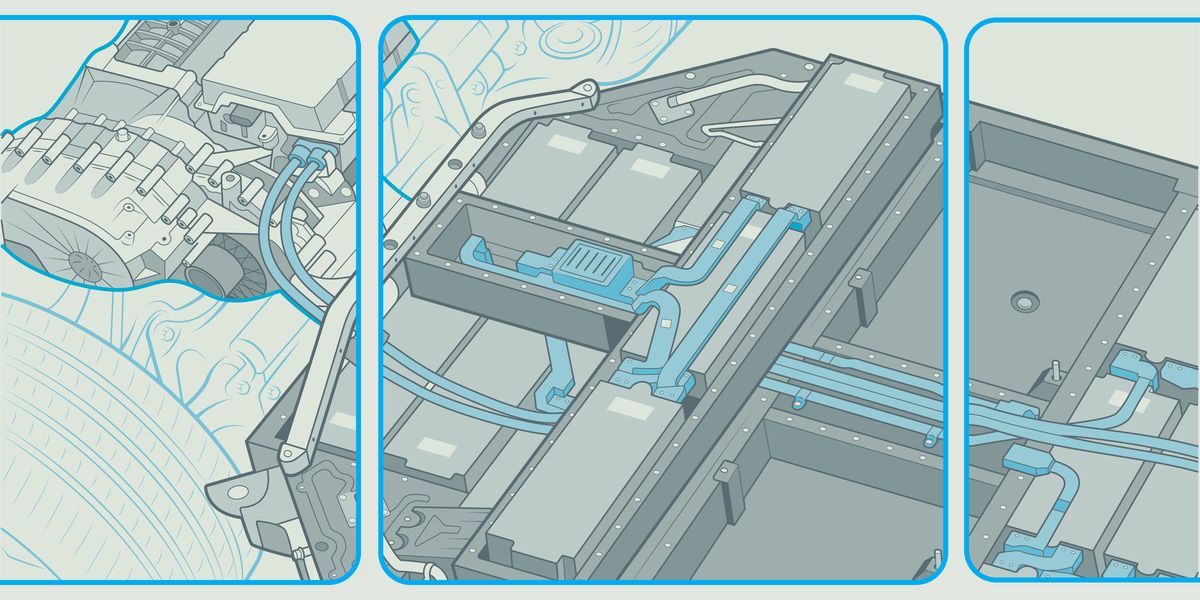
Why More Voltage Makes for Better EVs
Most EVs use a 400-volt electrical architecture. Here's why 800-plus volts is the future.

that has little relevance on 800volt.. 200 cells in series is a different monster.... than 3 vs 6 cells.There is a reason 12v became standard over 6v in the 50s.
It is very relevant. More voltage=more better.that has little relevance on 800volt.. 200 cells in series is a different monster.... than 3 vs 6 cells.
If that is all that matters...why not make it 3200 or 6400 volts?It is very relevant. More voltage=more better.
In a 6V system you had a battery that had 3 cells to get to 6V (nominal). If one cell fails the battery goes Kaput. You replaced the battery for a marginal cost. It took a couple minutes. It was never intended to last the vehicle life.the reason was the same though, 12V electrics worked better than 6V electrics
What does this have to do with 400v vs 800v? If either a 400v or a 800v battery goes bad you have to replace it. 800v is still better than 400v, just like 12v is better than 6v.In a 6V system you had a battery that had 3 cells to get to 6V (nominal). If one cell fails the battery goes Kaput. You replaced the battery for a marginal cost. It took a couple minutes. It was never intended to last the vehicle life.
They went to 12V and got twice the power. If one cell fails, the battery goes kuput. For a marginal cost you replace the battery. It still takes a couple minutes.
In a Tesla model 3 there are 7000 and some ought cells, wired together in a maze of series and parrallel. There is also intercooling between the cells. When a cell fails you loose that series of cells in the battery. The higher voltage, the more storage you loose with a single cell failure. The battery is not designed to be replaceable - and certainly not by the kid at the auto parts store.
Apples and oranges.
In a 6V system you had a battery that had 3 cells to get to 6V (nominal). If one cell fails the battery goes Kaput. You replaced the battery for a marginal cost. It took a couple minutes. It was never intended to last the vehicle life.
They went to 12V and got twice the power. If one cell fails, the battery goes kuput. For a marginal cost you replace the battery. It still takes a couple minutes.
In a Tesla model 3 there are 7000 and some ought cells, wired together in a maze of series and parrallel. There is also intercooling between the cells. When a cell fails you loose that series of cells in the battery. The higher voltage, the more storage you loose with a single cell failure. The battery is not designed to be replaceable - and certainly not by the kid at the auto parts store.
Apples and oranges.
Yes, except when a cell goes bad you will drop below design voltage. If the cell shorts it will drain the rest of the battery at rest.Not really: You get a reduced capacity but the battery still works. Like you would have with 2 or more 12V batteries in parallel.
It's true in theory. Only to be let down by the charging network. If you had 800V capable 350kW chargers all over the place it would be a no brainer. There's no doubt though while charging at 800V you can use half the amps for the same power which in turn means less heat.Watts = V x I so if you increase voltage, you get more power (watts). This part is straight forward.
The issue is on the battery side. Both the chemistry, and also the need to chain individual cells in series. If one cell fails, that means that whole series becomes worthless.
Everything is a trade off.
Sure.If the batteries are boosted from 400V to 800V will the vehicles burn better too?
View attachment 172171
Autoweek
I've said this but the Tesla crowd keeps saying it makes no difference.
Why More Voltage Makes for Better EVs
Most EVs use a 400-volt electrical architecture. Here's why 800-plus volts is the future.www.roadandtrack.com
Watts = V x I so if you increase voltage, you get more power (watts). This part is straight forward.
The issue is on the battery side. Both the chemistry, and also the need to chain individual cells in series. If one cell fails, that means that whole series becomes worthless.
Everything is a trade off.
If Tesla did it and changed all their superchargers to 800V we'd see an improvement. That's a massive sweeping expensive upgrade for a marginal improvement most wouldn't see especially if they really only charge at home. The conversion could mean it would charge even slower at home just because of the step up required to go to 800V from 110V-220V charging options.I've said this but the Tesla crowd keeps saying it makes no difference.
